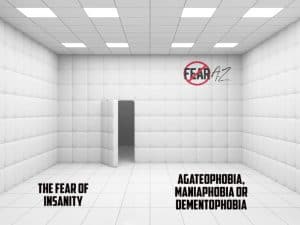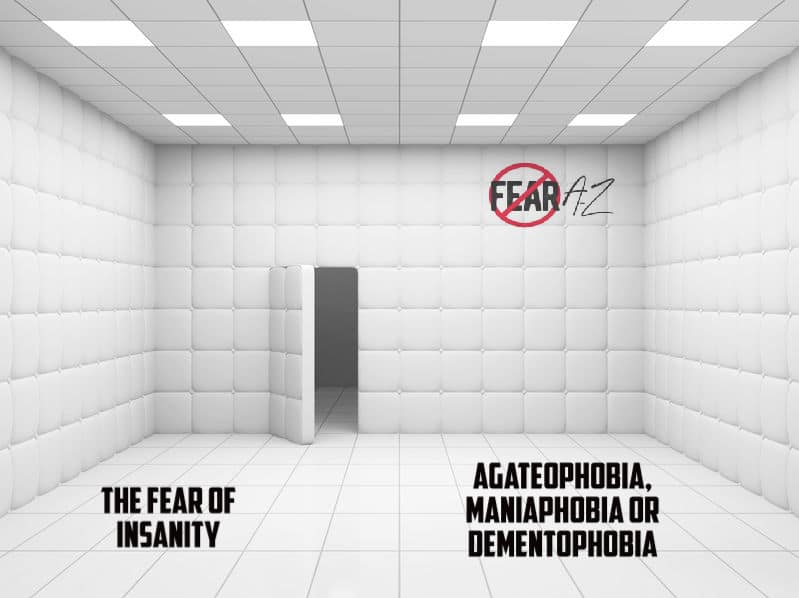Share This Article
The Fear of Insanity: Agateophobia
Does learning, reading, or watching movies about insanity in others trigger extreme fear for you? Do you feel sick to your stomach, dizzy or apprehensive when you see insanity in a person or even portrayed on screen?
Does even discussing insanity make your palms sweat, your mouth dry, your head spin?
If you have any of these symptoms, you may suffer from agateopohbia, also known as maniphobia or dementophobia , or the fear of insanity.
The first step toward limiting this fear or phobia is to understand why you have it. Where does this fear come from, and what can be done to limit or alleviate the problem?

Usually FearAZ limits time spent explaining the origins of phobia names.
After all, it’s not really essential to the end goal of helping you overcome your fear. But since the fear of insanity has three known technical names, let’s start there.
Agatephobia, maniaphobia, and dementophobia are all names for the same basic condition: the excessive fear of going insane.
Why three names for the same condition?
Each technical name has its own roots, depending on if you label the condition as insanity, mania, or demented: agateophobia, from the Greek word agate meaning “insanity;” maniaphobia from the Greek word mania, meaning “madness;” and dementophobia which takes its origin in Latin terms with de meaning “away from,” and ment meaning “mind.”
In any language, the fear of insanity can create serious issues in your quality of life.
What Causes or Triggers Agateophobia?
Some people have the constant feeling they will go or are going insane. Those suffering from phobias have elevated fear levels much stronger than average—far and above a simply scary thought.
Compounding factors can bring on bouts of agateophobia, such as genetics or environmental triggers.
If someone in your family has unnatural fears or phobias, there is a chance it can be passed on to you from simple exposure. A family history of insanity could cause an unnatural fear of “becoming mad.”
Some of the antiquated treatments used on the insane have also frightened people for decades. Electric shock therapy, lobotomies, bloodletting, and of course, isolation or incarceration. These alone could be enough to cause extreme fear of going insane, which, over time , can manifest into a full phobia.
Personal experiences can also have impacts on your mental health, such as bad encounters involving insanity or an insane person. Seeing the effects of insanity could instill a deep fear of developing insanity yourself.
Your upbringing can also have an impact. Witnessing a relative with extreme mental health issues could have a deep impact on you. This experience may develop into a phobia that may need treatment to uproot.
Symptoms of Agateophobia, Maniaphobia, or Dementophobia
Physical symptoms for the fear of insanity can vary from person to person. As with most phobias or extreme fears, the standard list of symptoms do apply:
- Sweating
- Rapid heart rate
- Dizziness
- Lightheadedness
- Dry mouth
- Hyperventilation
- Confusion
- High blood pressure
- Nausea
There are probably other physical symptoms associated with dementophobia which are not listed.
Psychological Symptoms:
- Panic attacks
- Anger or extreme agitation
- Feeling dread
- Feeling isolated
- Confusion
- Lack of concentration
- Loss of control
- Actual fear of death
- Moodiness

Treatments for Agateophobia, Maniaphobia, or Dementophobia
The fear of insanity can place the sufferer in a dilemma treatment wise. For some, seeking treatment for the phobia can be justification for the belief in and of itself. Why am I taking medication? Am I going insane?
First, educate yourself. Learn about your specific fear, its roots, and why it affects you. Then, research treatment methods. Find one which best suits your needs and one you feel most comfortable with.
One treatment you’re sure to come across is cognitive behavioral therapy (CBT). CBT is a relatively short-term treatment that teaches you to change your thought processes. It has been shown effective in reducing agateophobia, maniaphobia, or dementophobia.
Hypnotherapy is another possible method to research. A hypnotist may be able to help limit the fearful thoughts, which will reduce your anxiety. You may also need a mixture of medication and therapy.
The key is to find the treatment that works for you. The first step towards treating dementophobia is yours alone to take.



